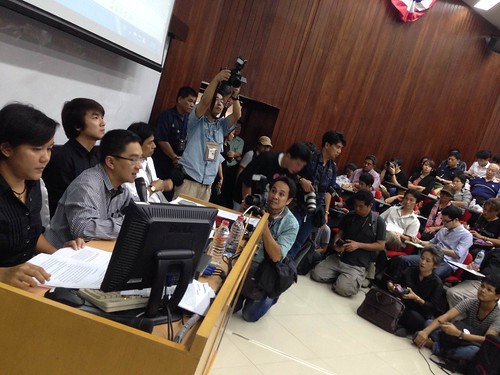Nitirat, a group of law scholars from Thammasat University, warned on Thursday that the passing of the blanket amnesty bill would contradict the constitution and could results in lawsuits at the Constitutional Court against Members of Parliament.
Nitirat, known as the Enlightened Jurists in English, said the blanket amnesty bill, which was passed by the House of Representatives early on Friday morning, violates parliamentary regulations which stipulate that the second reading of a bill must not contradict the principles of the original bill passed on the first reading.
“In considering the draft bill that was proposed on the first reading, MPs accepted the principle of only giving amnesty to the people,” said Assoc. Prof. Worachet Pakeerut at a public seminar at Thammasat University.
“So when the Ad Hoc Parliamentary Committee altered the draft bill, it violated Article 117 Paragraph 3 of the Rules of Parliamentary Procedure, and consequently also contradicted the Constitution.”
He said the blanket amnesty bill also contradicts the UN International Covenant on Civil and Political Rights since it would grant impunity to state officials who have committed human rights violations.
“Passing this bill would set a horrible standard and make the authorities unafraid of any wrongdoing and accountability in the future,” said Worachet, a key member of Nitirat.
The amnesty bill, proposed by Pheu Thai MP Worachai Hema, granted amnesty to protestors in all political incidents taking place between September 19, 2006 and May 10, 2011. Amendments by the Ad Hoc Parliamentary Committee in the second reading expanded the amnesty to include the authorities and those who gave orders and committed crimes in political incidents between 2004 and August 8, 2013, including those were accused by the now-defunct Assets Examination Committee and convicted.
Nitirat criticized the extended duration as dubious as certain crimes not relating to the 2006 coup may be granted amnesty, some of which would not deserve it.
Piyabutr Sanganokkul, another law academic, said the fact that the bill exempted those convicted under the lèse majesté law from the amnesty was contrary to Article 30 of the Constitution that guarantees equal treatment to all citizens. The claim made by some Pheu Thai MPs that lèse majesté cases are special crimes since they relate to the monarchy was a “pure sham,” he said.
The law academics emphasized that the amnesty bill must separate the protestors from the authorities who committed political actions between September 19, 2006 and May 9, 2011, as well as those accused of crimes by groups of people or entities set up by the Council of National Security, the 2006 coup makers. Protestors whose actions were deemed politically motivated, as well as those guilty of political expression after September 2006, must be released immediately, they said.
The group also emphasized the constitutional draft to ‘erase the consequences of the coup and the conflict’ which they had earlier proposed in January this year. This draft proposed setting up a committee comprising judges, the Attorney General, MPs and members of the public, all of whom would be nominated by parliament, who would review if the crimes committed during the stated period were politically motivated, and grant them amnesty.
The constitutional draft purposed by Nitirat also stated that to “erase the consequences of the coup,” the government must reopen Thaksin’s corruption case through normal judicial procedures, as well as annul Article 37 of the 2006 temporary constitution so that those who carried out the 2006 coup would not be protected by the amnesty. This would open the chance for the coup makers to be prosecuted.
“But let’s see if those who proposed the wholesale amnesty bill would dare to think about this,” said Piyabutr.



